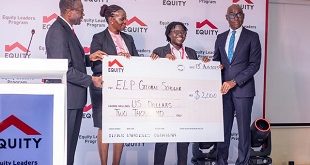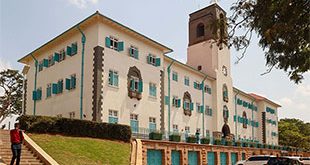
By Isaac Mufumba
The party has no budget, trading arm or known financiers
Seven years after the ruling National Resistance Movement (NRM) was registered as a political party, it has no annual budget nor a clear financial system to guide expenditures on its activities.
The NRMs Deputy Spokesman Ofwono Opondo’s insistence that the party has an annual budget is promptly shot down by the admission of another senior party official that indeed they dont have any.
No, we dont have that (budget) and I have never had a budget for my activities – not even a shilling,†says the NRM Vice Chairman for Eastern Region and former Minister of State for Health, Capt. Mike Mukula. His assertion is corroborated by another member of the National Executive Council, who declined to be named. He says they have never discussed the party budget, a confirmation that it does not exist.
Yet other political parties like the Democratic Party, Uganda Peoples Congress and Forum for Democratic Change have annual budgets, which they recently passed.

The UPC Treasurer Peter Mukidi Walubiri says the party has a Shs33 billion budget for 2010/2021 ending next June. The FDC Spokesperson Wafula Oguttu says the partys National Conference passed a Shs23 billion budget in February this year. The DP Treasurer Issa Kikungwe too says his partys National Executive Committee recently passed a Shs.6 billion budget for this year. All budgets cater for administration and campaigns for the next general elections.
Its the NRM, Uganda’s biggest political party, which does not have a budget among the top four political parties. It does not run any known business that generates revenue for the party. Neither is it officially funded by the government like in the case in Tanzania and South Africa where parties have business subsidiaries which generate revenue and also get funding from the government on the basis of their numerical strength in parliament.
Although the Political parties and Organisations Act was amended to provide for government funding to parties, it has never been operationalised.
Except for the mid 1990s when NRM, hitherto called the “Movement systemâ€, set up Danze Enterprises Ltd (now defucnt) as its trading arm, it has no other known business subsidiary that generates money for it. So where then does it get money to finance its programmes?
Mukula says that in the absence of funding from the party headquarters, he and other NRM officials usually use their personal resources to do partys official work. However, although its true some party officials inject in personal money, its apparent that this is too little to finance the partys national programmes like mobilisation, recruitment, transport costs, office maintenance etc. These are programmes that require huge amounts of resources that cannot be executed on individual funding. Jinja East MP Nathan Igeme Nabeta says that each of the NRMs 212 MPs contributes Shs100,000 to the party every month. This translates into Shs21,200,000 a month or Shs254,400,00 a year. However this amount is like a drop in the ocean. It cannot even finance one NRM national conference in a year. For instance the NRM spent Shs4.5 billion on allowances and transport of the 30,000 delegates for the June 25-27 NRM conference this year. Each delegate received Shs150,000. Where did the money come from?
So how is such a funding gap filled?
Most of the top NRM party leaders also hold big government offices. Thus they use the national budgetary allocations to their government offices to subsidise party work. Government sources say some of the money is scooped from the classified budget votes (which are not subject to audit under the pretext of protecting national security) and other projects under the budgets of the respective offices. Thats why, observers say, more than half of the NRM executive are either cabinet ministers or hold other big government jobs where they can use their office resources to subsidise party activities.

FDC Vice President, Proscovia Salaamu Musumba too says the NRMs biggest financier is government. She says that money from government in form of salaries and allowances, fuel, airtime and transport are given to party cadres in the employment of government. It is those resources which are used to run the NRM, she says.
This assertion is reinforced by Godber Tumushabe, Executive Director of the Advocates Coalition for Development and Environment, a think tank on public policy analysis.
It is not possible to separate the NRM as a party from the government, says Tumushabe.
He says that the NRM and its cadres are maintained through a carefully weaved patronage system. He said that 33.7 percent of the 2010/11 budget has been allocated to the public administration sector, defence and security where most of the NRM stalwarts are employed. For that reason, he says, it is not possible for the NRM to have a CEC that is dominated by people who do not hold government jobs.
For instance, without considering the President, more than half of the NRM’s 22 Central Executive Committee officials are either cabinet ministers or hold equivalent/big government offices.
The NRM National Chairman is President Yoweri Museveni; the Second National Vice Chairperson is Deputy Speaker of Parliament Rebecca Kadaga; the Vice Chairman for Central Region is Vice President Gilbert Bukenya; the Vice Chairman for Western Region is Uganda’s High Commissioner to Kenya Matia Kyaligonza.
The Secretary General is Security Minister Amama Mbabazi; his Deputy Dorothy Hyuha is Minister without Portfolio; NRM Caucus Chairman Daudi Migereko is both the Government and NRM Chief Whip and sits on the cabinet. He is remunerated and facilitated by the state like a minister.
The Chairperson of the NRM Women’s League is Education Minister Namirembe Bitamazire; the Chairperson of the Workers, Institutions, Elders and Historicals Leagues are Ministers Bakabulindi (Sports) and Kabakumba Masiko (Information); Fred Mukisa (Fisheries) and Kirunda Kivejinja (Deputy Premier and Minister for Internal Affairs). The chairman of the Youth League is Abbas Agaba, a State House employee.
It is only the first National Vice Chairman, Haji Moses Kigongo, Regional Vice Chairpersons Gen. Moses Ali (Northern), Capt. Mike Mukula (Eastern), NRM Electoral Commission Chairperson Felistus Magomu, Treasurer Ndawula Kaweesi and his Deputy Katongole Singh and the Chairpersons of the Entrepreneurs, Disabled and Veterans leagues Hassan Basajjabalaba, Florence Nayigga and Maj. Gen. Jim Muhwezi, who do not hold cabinet jobs or senior government offices. However it is important to note that by October 2005 when the NRM Central Executive Committee was elected, Muhwezi and Mukula were in cabinet. Muhwezi was the Minister for Health while Mukula was his deputy.
But even members of the CEC who dont hold government jobs are beneficiaries of huge government subsidies or have strong business relationships with the government. For example the Chairman of the Entrepreneurs League, Hassan Basajjabalaba, has been a beneficiary of a Shs21 billion loan from bank of uganda which has not replied to date.
The NRM offices whose heads do not hold lucrative government offices or get a lot of business benefits from the government, are actually either dormant or in virtual limbo due to financial constraints. They have not held a single any meeting since they were formed in October 2005.
The biggest problems we have are finances and organisation. All the leagues [party wings] have not held any meetings,†says Maj. Gen. Muhwezi, the Chairman of the Veterans League and a member of the Central Executive Committee.
While presenting a report to the NEC meeting of 12th January 2010 at State House in Entebbe, Mbabazi too pointed out poor party funding as one of the NRM’s problems since 2005.
Muhwezi said the MPs contributions are used for rent and facilitation of party branch offices countrywide. He says facilitation to some branches takes a long time to be remitted, leaving the respective office staff to go for months without pay. He cited the case of Rukungiri branch, which has gone for months without pay. However, Muhwezi blames this problem on disorganisation within the party.
There are many organisations which dont have money, but they organise well enough to get the money. In our case we are not,†he says without elaborating.
The Secretary General of the Interparty Cooperation (IPC), Dr Frank Nabwiso, says that the NRM has over the years built a network through which it draws money from public coffers through the State House “classified“ expenditure, a charge refuted by the NRM deputy spokesman, Ofwono Opondo. He says local business people and politicians and business entities in the Diaspora fund the party.
This raises more questions than answers. If the party has known financiers, why does it have an annual budget? Why can hostile saying the law allows the NRM to protect the identity of its funders. However he did not name the law.
Section 9 of the Political Parties and Organisations Act require political parties to periodically declare their assets and liabilities to the Electoral Commission and to disclose sources of their funds and other assets.
Opondo did not cite a contrary law that allows concealment of sources of funding for a political party.
Non-compliance with provisions of Section 9 of the Act attracts court proceedings against the offending party.
Where a political party or organization fails to comply with this section within 21 days after the notice from the Electoral Commission to do so, the Electoral Commission may apply to the High Court for an order to de-register the political party or organisation, reads section 9(6) of the Act.
Section 12 of the Act also provides that if the EC fails to make a party comply, it petitions court. When the party is convicted and court issues the deregistration order, the court prescribes the mode of disposal of the partys assets, rights and liabilities.
Under the Act, political parties are also required to have audited books of accounts verifiable by the Electoral Commission. The NRM has not met these legal requirements, but so are other political parties.
 The Independent Uganda: You get the Truth we Pay the Price
The Independent Uganda: You get the Truth we Pay the Price



